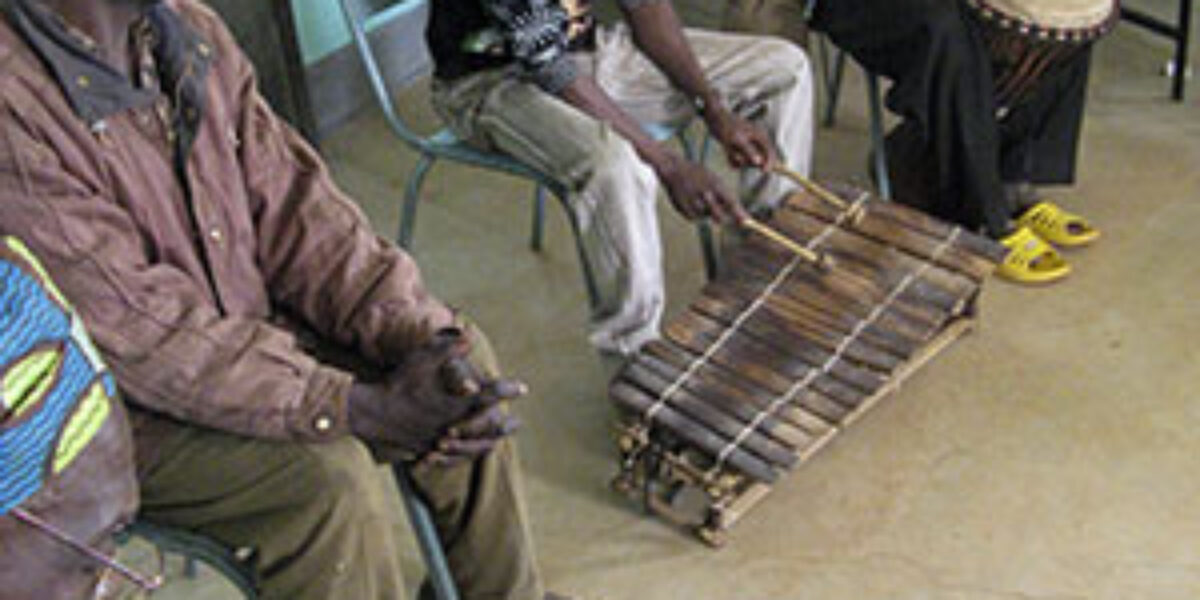ORODARA, Burkina Faso (AIMM/Mennonite Mission Network) – The eight workshop participants eyed each other self-consciously and shifted uneasily on metal chairs in the Orodara recording studio on Jan. 19. Though Souleymane Traoré had carefully chosen each person for the two-day pioneering attempt to create the first Christian music in the Siamou language, the participants had little in common – except the language and an interest in music.
Three griots (traditional musician-storytellers), a Protestant pastor’s wife, a Catholic elder and three Mennonites – one a shoe repairman, the second a Bible translator and the third a Canadian linguist – had come together to compose and record songs for the Siamou church.
Though the workshop began awkwardly, Traoré was confident of an exuberant outcome.
“When the music is in your mother tongue and in your mother music, people can sing with greater joy and understanding,” Traoré said. “It makes you do more than just sing. It makes you dance.”
According to Traoré, a gifted linguist who has worked alongside Mennonite Bible translators for a decade, singing adds importance to words.
“On the wedding day and during initiation days, all advice preparing the young men and women for marriage and right living is sung,” Traoré said.
Lillian Haas Nicolson, the Canadian linguist at the music workshop, has served in Burkina Faso since 1999 with Africa Inter-Mennonite Mission, Mennonite Mission Network and Mennonite Church Canada Witness and their predecessor agencies. She was skeptical of what could happen in two days with the limited resources available to participants.
“Only the stories of the creation were translated and in book form. Only Solo [Souleymane Traoré] was literate in Siamou. And the griots weren’t even Christian,” Nicolson said.
Mary Hendershott, a visiting ethnomusicologist, guided participants through techniques for selecting texts for a refrain. Then, Traoré read the biblical creation account and participants talked about the aspects of the story that touched them most profoundly.
In the middle of the discussion, a griot began picking out a tune on the balaphon (a wooden xylophone) and started singing his interpretation of the story.
After the griot had finished, Ruth Traoré– the pastor’s wife, hesitantly gave voice to a refrain that was in her heart.
“The others sang along with Ruth obediently, but with little enthusiasm,” Nicolson said.
When participants realized that Ruth Traoré’s melody was in the scale of another ethnic group rather than in their own, the griots transposed the melody into a familiar Siamou key. Immediately, the drummers found the rhythm.
“Everyone jumped up and started singing and dancing,” Nicolson said. “The whole atmosphere of the room radiated joy in the combination of music and words praising God in their mother tongue.”
Nicolson’s initial skepticism dissolved. After seeing how music helped words come alive, she, now, thinks that Mennonite pastors should be singing their sermons. She believes that the workshop’s impact will go beyond the four songs that were composed and recorded.
“The griots heard part of the biblical story for the very first time. We pray that the words they put to music will transform their lives. Also, the joy of composing their own music sparked comments like, ‘Let’s do this again.’ “We hope that these participants will motivate others to continue composing songs in their heart language,” Nicolson said.
Souleymane Traoré, not a close relative of any of the other Traorés attending the workshop, weighed the cost of following Jesus for many years after he first heard the good news in the biblical books he helped translate. He knew if he became a Christian his family would reject him. After his public confession of faith, his father did try to force him to return to Islam. Now, however, there is peace between the two.
“Eventually, my father saw all the changes that came to my life because of Christianity,” Traoré said. “There’s really no problem between us today. I am fully his son and I respect him as my father. Everything is good.”
Since 2005, Traoré has led a Bible study group in his village of Tin, eagerly anticipating the day when the entire Bible is translated into Siamou. Until then, he prepares the studies using Dioula and French Bibles. Dioula is a commercial language used for communication between ethnic groups.
“I have to struggle between Dioula and French. It would be so easy and so exciting to be able to read in Siamou. The group is interested in God’s word, but it’s hard because we don’t have the rest of the Bible in our language,” Traoré said.
For the past ten years, Nicolson has immersed herself in the Siamou language and culture and helped form a literacy team. One of fruits of the literacy team’s work is a primer for adults, to prepare them to read the Bible passages as they are translated.
After her marriage to Norm Nicolson in 2006, the couple has served together in Burkina Faso. Lillian Nicolson collaborates with Evangelical Mennonite Conference colleagues, Lois and Paul Thiessen of Manitoba, who began the Siamou Bible translation. Norm Nicolson works as a recording engineer, helping produce radio programs for Eglise Evangélique Mennonite du Burkina Faso and audio cassettes of the Bible in various African languages.







